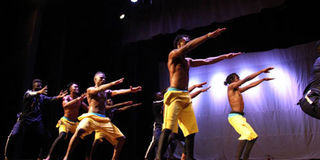Dance degree to return to Makerere

Although it had been phased out because of logistical issues caused by dwindling numbers in the course, dance could be set to return to Makerere University following a need for more professional dancers. Photo Andrew Kaggwa
What you need to know:
- Most dancers are self-trained that some believe they do not need an education to master what they do but trainers insist that education is important for guidance and better understanding of the craft, a reason the course may be making a comeback to Makerere’s lectures.
Dance as an art could be one of the most misunderstood forms of performance. For different performers, it is an art they can do away with, while others believe anyone that walks can dance thus there is always little need in pushing for professionalism.
It was probably the reason some administrators at Makerere University reasoned that it was inevitable to scrap the course in 2010; along with a Bachelors degree in Drama, Science in Accounting, Science in Finance and Science in Marketing, among others in an effort to eliminate duplication.
However, some voices in the Arts industry claim that at the time, management almost scrapped all the Performing Arts Training Institute courses since they were not economically viable, because they did not attract the number of students needed to economically sustain their units.
Last week, while attending the Open Dance Day on Saturday, the Makerere University vice chancellor, Prof Barnabas Nawangwe, commended the organisers for putting together a brilliant show and also noted the importance of reinstating the Bachelor of Art in Dance.
“This will be my project and whoever stands in the way should beware,” he said.
He noted that due to some issues, the course has been away though the process of reinstating it has already kicked off.
The Open Dance Day is an event that was held in collaboration between Makerere University’s Department of Performing Arts and Film and the Norwegian University College of Dance.
The two institutes have been working together since 2010 and in 2016, there was a renewal of their Memorandum of Understanding to support a fundraising towards building the centre as well as staff and student capacity development.
Why dance had left
Andrew Ssebagala, an arts facilitator and founder of House of Talent, an events and talent management company, says that news of having reinstating the course is good because the industry needs the professionalism.
“Having the course away meant that dancers were self-training, which in the long run hurt the whole craft that works well with choreographers that are trained,” he said.
In the past, many people were getting into the art discipline without an education which many argued was one of the reasons courses such as dance suffered with numbers.
Grace Ibanda, a choreographer and a teaching assistant at the time the course was scrapped, says a lot of factors led to the course being scrapped but the numbers and financial viability took to the fore.
“Dance has always been viewed as a weak link, at that time, we did not have facilities such as a modern dance studio; generally dance got a raw deal,” she says.
At that time, they also did not have enough manpower, a problem that was made worse when masters degree in a related field was a requirement for people teaching a course.
Ssebagala says then, it was expensive for some teaching staff to go for a masters but besides that, a core dance masters degree was one that could not be studied in Uganda.
What has changed?
Ibanda believes that things may have changed since then mainly because of the presence of the Norwegians, “their support saw young people sponsored to study dance at an advanced level.”
In the same vein, Sebbagala says the main reason dance is making a comeback is because of the Norwegians since the time the course was scrapped, the argument was that it did not make business sense.
But he notes, that with Norwegians helping in the funding of the construction of an arts centre, the numbers will easily come back.
Julius Lugaya, founder Dance Week Uganda, says much of Uganda’s contemporary dance scene has its roots in Namasagali College.
He believes that bringing back dance to the Institute of Performing Art and Film is because people have started seeing its potential.
“Over the years, dance depended on cultural players such as Goethe Zentrum, Dance Week and Alliance Francaise but has somehow managed to survive,” he says.
Of recent, most dancers are self-trained that some believe they do not need an education to master what they do, though, Lugaya and Ibanda insist that education is important for guidance and better understanding of the craft.
Why it was scrapped
Some voices in the Arts industry claim that the time dance was scrapped as a course at Makerere, management almost scrapped the entire Performing Arts Training Institute courses since they were not economically viable, because they did not attract the number of students needed to economically sustain their units.



